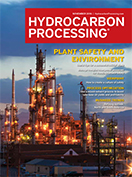
November 2016
Special Focus: Plant Safety and Environment
Cracking furnace operations (e.g., for the steam cracking of naphtha feedstock into olefins) are an essential part of hydrocarbon (HC) refining; however, they are known to be potentially dangerous and complex to manage.
Improper management of hazardous waste can pose serious legal and regulatory liabilities to a company.
The products we use on a daily basis comprise a variety of chemicals.
This two-part study will investigate the challenges of migrating legacy safety systems, and review effective means of repeatedly and effectively executing compliant migrations.
Process Control and Instrumentation
Turnarounds in continuous operating process plants, such as refineries and petrochemical processing plants, are complicated and costly events where each day of downtime equals lost revenue.
Process Engineering and Optimization
Through research and development (R&D), the commercial application of a mixed-solvent (MS) approach using a mixture of different co-solvents resulted in higher lube raffinate yields without affecting the lube oil quality.
Part 1 in this series, “Build a diesel fuel performance additive, the right way,” (Hydrocarbon Processing, October) detailed the required chemical additives and test methods for achieving ideal engine performance and fuel economy.
Columns
Over my 40-yr professional career in the oil and gas processing, refining and petrochemical industries, I have seen many well-intended government regulations completely backfire, cause irrational responses or get lip service.
With relatively few exceptions, industry guidelines and standards allow an increased understanding of best practices.
In the downstream industry, where production is at an all-time high and uncompromised safety is imperative, plant owners and operators are responding by implementing the latest time-saving technologies and systems to automate and improve human processes.
To stay competitive and thrive in today’s uncertain and volatile energy market that is characterized by major shifts in supply and demand dynamics, refiners must find ways to increase operational efficiencies, maximize productivity and produce refined products at lower costs.
Gathering accurate data is essential for failure analysis and other types of research.
Implementing safety best practices helps reduce employee risk, which helps minimize the number of workplace accidents and ensures compliance with industry and government regulations.
Trends and Resources
As mentioned in the editorial comment of the October issue of <i>Hydrocarbon Processing,</i> the nominees for the 2016 Top Project awards are out.
<i>Hydrocarbon Processing</i> continues its series on the global refining industry. This series provides a detailed outlook on the state of the global refining sector, active and new project developments, and an overview of major refining trends in each region. Part 3 provides an overview of the refining sectors of Canada, Latin America and the US.
US margins fell due to the slowing of domestic gasoline demand, as the driving season ended amid high inventories.
Callidus Technologies, a Honeywell UOP Company, has inaugurated a new state-of-the-art facility for the testing of gas combustion flares at its manufacturing facility in Beggs, Oklahoma.
Abdulaziz F. Alkhayyal has been elected to the board of directors of Marathon Petroleum Corp., increasing the board’s size to 11.

- India receives fuel oil cargo in Russian SCF tanker after brief halt 4/26
- Biden administration (U.S.) to release SAF tax credit model 4/26
- Boeing, Wagner advance Australia’s SAF Industry 4/26
- S-Oil expects Q2 refining margins to remain steady then trend upward 4/26
- Vitol to charter supertankers from U.S. to Nigeria's Dangote refinery 4/26
- Refiner Valero beats profit estimates on resilient demand, tight supplies 4/26




